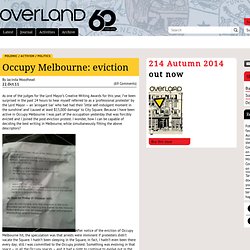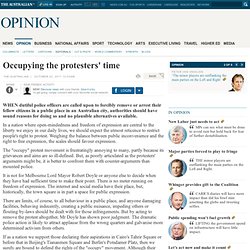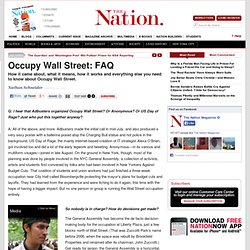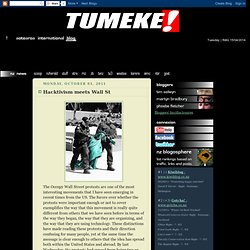

Occupy Melbourne: eviction « Overland literary journal. As one of the judges for the Lord Mayor’s Creative Writing Awards for this year, I’ve been surprised in the past 24 hours to hear myself referred to as a ‘professional protester’ by the Lord Mayor – an ‘arrogant liar’ who had had their ‘little self-indulgent moment in the sunshine’ and ‘caused at least $15,000 damage’ to City Square.

Because I have been active in Occupy Melbourne. I was part of the occupation yesterday that was forcibly evicted and I joined the post-eviction protest. I wonder, how I can be capable of deciding the best writing in Melbourne, while simultaneously fitting the above descriptors? After notice of the eviction of Occupy Melbourne hit, the speculation was that arrests were imminent if protesters didn’t vacate the Square. Occupying the protesters' time. WHEN dutiful police officers are called upon to forcibly remove or arrest their fellow citizens in a public place in an Australian city, authorities should have sound reasons for doing so and no plausible alternatives available.

In a nation where open-mindedness and freedom of expression are central to the liberty we enjoy in our daily lives, we should expect the utmost reticence to restrict people's right to protest. Weighing the balance between public inconvenience and the right to free expression, the scales should favour expression. The "occupy" protest movement is frustratingly annoying to many, partly because its grievances and aims are so ill-defined. But, as poorly articulated as the protesters' arguments might be, it is better to confront them with counter-arguments than mounted police. It is not for Melbourne Lord Mayor Robert Doyle or anyone else to decide when they have had sufficient time to make their point. Twitter. A Guide to the Occupy Wall Street API, Or Why the Nerdiest Way to Think About OWS Is So Useful - Alexis Madrigal - Technology.
The most fascinating thing about Occupy Wall Street is the way that the protests have spread from Zuccotti Park to real and virtual spaces across the globe.

Metastatic, the protests have an organizational coherence that's surprising for a movement with few actual leaders and almost no official institutions. Much of that can be traced to how Occupy Wall Street has functioned in catalyzing other protests. Local organizers can choose from the menu of options modeled in Zuccotti, and adapt them for local use. Occupy Wall Street was designed to be mined and recombined, not simply copied. This idea crystallized for me yesterday when Jonathan Glick, a long-time digital journalist, tweeted, "I think #OWS was working better as an API than a destination site anyway.
" API is an acronym for Application Programming Interface. What an API does, in essence, is make it easy for the information a service contains to be integrated with the wider Internet. *General* Occupy Wall Street: FAQ. Q: I hear that Adbusters organized Occupy Wall Street?

Or Anonymous? Or US Day of Rage? Just who put this together anyway? A: All of the above, and more. Adbusters made the initial call in mid-July, and also produced a very sexy poster with a ballerina posed atop the Charging Bull statue and riot police in the background. We Recommend Starting at 1AM, NYPD moved in to clear out Liberty Square, destroying protesters property and tents. About the Author Nathan Schneider Nathan Schneider’s ’s book Thank You, Anarchy: Notes From the Occupy Apocalypse was recently published by... #OccupyWallStreet: There's Something Happening Here, Mr. Jones. "During movement times, the people involved have the same problems and can go from one communication to the next, start a conversation in one place and finish it in another.

Now we're in what I call an organizational period, which has limited objectives, doesn't spread very rapidly and has a lot of paid people and bureaucracy. It's completely different from what takes place when there is a social movement. " --Myles Horton, from his book "The Long Haul", talking about his work with two American social movements, the labor movement of the 1930s and the civil rights movement of the 1960s America is about to experience the same youth-driven, hyper-networked wave of grassroots protests against economic inequality and political oligarchy that have been rocking countries as disparate as Tunisia, Egypt, Israel, Greece and Spain.
Like many observers, I started out sympathetic but skeptical when I heard about the "Occupy Wall Street" protest several weeks ago. Hacktivism meets Wall St. The Occupy Wall Street protests are one of the most interesting movements that I have seen emerging in recent times from the US.

The furore over whether the protests were important enough or not to cover exemplifies the way that this movement is really quite different from others that we have seen before in terms of the way they began, the way that they are organizing, and the way that they are using technology. These distinctions have made reading these protests and their direction confusing for many people, yet at the same time the message is clear enough to others that the idea has spread both within the United States and abroad.
By last Wednesday, the protests had spread from being two or three cities organizing or occupying, to 52 planning protests. While it remains to see how many people attend these events, the uptake and reach of this movement would seem to indicate that it is gaining some traction. How is it that a movement can be so unclear to some, yet so clear to others?